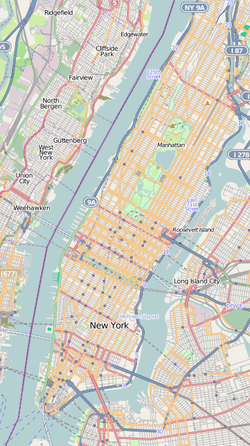Radisson Hotel Martinique
| Radisson Martinique on Broadway | |
|---|---|

Radisson Martinique, south facade
|
|
| General information | |
| Architectural style | French Renaissance |
| Location | 53 West 32nd Street (also known as 1260-1266 Broadway) Manhattan, New York United States |
| Coordinates | 40°44′54″N 73°59′16″W / 40.74833°N 73.98778°WCoordinates: 40°44′54″N 73°59′16″W / 40.74833°N 73.98778°W |
| Construction started | 1897 |
| Opening | 1898 |
| Management | Radisson Hotels |
| Height | 200 feet |
| Technical details | |
| Floor count | 19 |
| Design and construction | |
| Architect | Henry Janeway Hardenbergh |
| Other information | |
| Number of rooms | 532 |
| Number of restaurants |
Martinque Cafe Kum Gan Sun |
| Website | |
| Designated | 5 May 1998 |
| Reference no. | LP-1983 |
| References | |
The Radisson Martinique on Broadway, formerly the New York Radisson Martinique Hotel, is a historic hotel at 53 West 32nd Street (also known as 1260-1266 Broadway) in Manhattan, New York City. Built by William R. H. Martin in a French Renaissance style. The hotel belongs to the Historic Hotels of America. It was the setting for Jonathan Kozol's study, Rachel and Her Children: Homeless Families in America (1988).
The hotel was built on lots situated at West 33rd Street and West 32nd Street, and also the northeast corner of Broadway. The 12-story 165-room Hotel Alcazar at one time adjoined the Hotel Martinique on the north side of 34rd Street, east of Broadway. To the west is the Empire State Building. Also nearby are the Fifth Avenue shops, the New York Penn Station, and the Grand Central Terminal.
The hotel was built in 1897-98 by William R. H. Martin, who headed the Rogers Peet business. The French Renaissance style was by a design of Henry Janeway Hardenbergh. Martin had purchased the plot in 1892, and in 1893 and 1895, he bought additional land to build the hotel that he desired. The uptown store of Rogers Peet was in the same building. After the Martinique opened, Martin began running a series of short ads to introduce his house, the ads appearing several times a week in the Sun and Times.
The Hotel Martinique was designed originally as an apartment house. Later, it was found that the needs of the location would be better suited for a hotel. This was done and still there was not room enough for the growing demand of the neighborhood. A first small expansion occurred 1901-03, followed by a larger one in 1907-11, which, with the exception of the small piece of property on the corner of 33rd Street and Broadway, gave the hotel a frontage of two streets and the Avenue with a concourse running through the hotel the entire length of Broadway between the two blocks. The 1910 addition included a continuation of the original hotel, situated on 33rd Street, which ran around a small plot of ground on which were low buildings and thence across to Broadway halfway down to 32nd Street. The new addition began where the old one left off and continued to 32nd Street, running for some distance down Thirty-second Street with the main entrance on that side. Room prices in 1910 ranged from US$3.50-$6.00 and up per day. The Omar Khayyam room served as the venue for the Gus Edwards Revue's "1918 Version of a Night with Omar Khayyam", a twice-nightly performance.
...
Wikipedia

